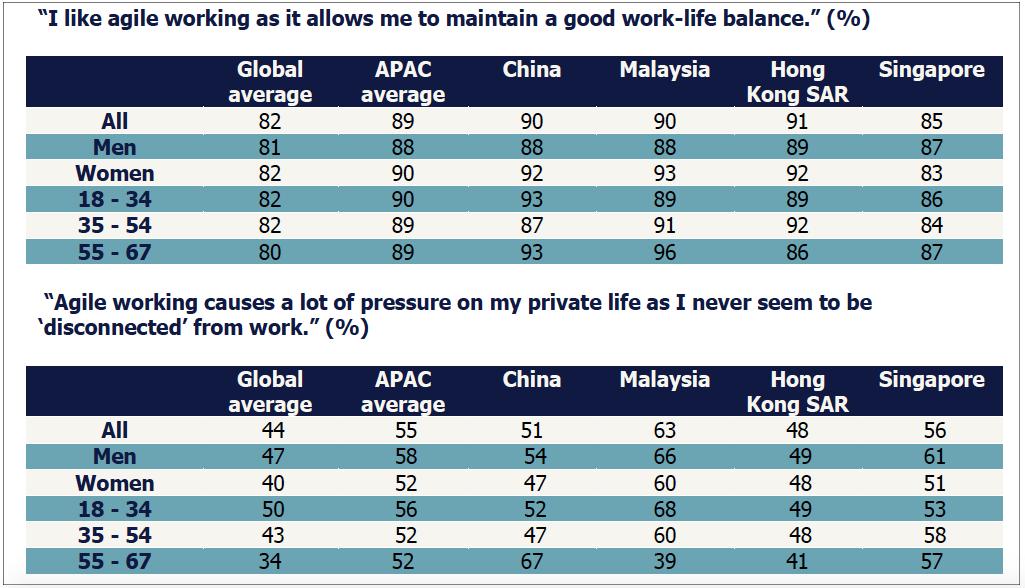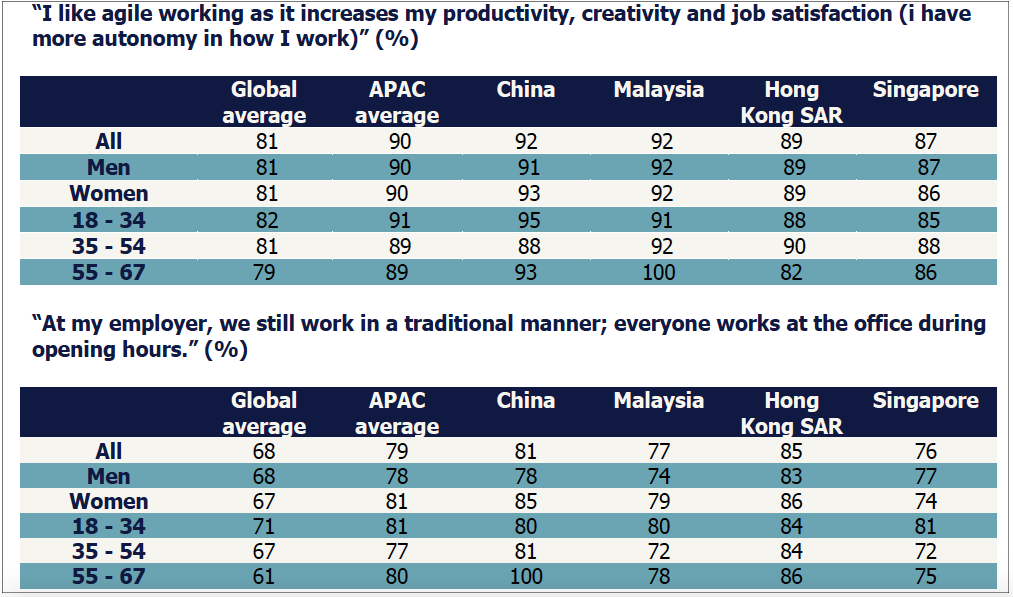Employees want work-life balance, don’t know how to ‘disconnect’ from work
By Digital News Asia July 24, 2018
- Three in four employees in Singapore have the flexibility to work from home
- Malaysian millennials (68%) feel more pressured to be “always-on”

EIGHT in 10 employees around the world said that they prefer agile working as it allows them to maintain a good work-life balance.
The sentiment is higher in Malaysia, with 90% of employees wanting the freedom to decide for themselves where, when and how they want to do their work. In fact, the same number of respondents prefers the flexibility as they believe it can increase work productivity and improve job satisfaction.
Despite the high expectation for better flexibility at work, more than six in 10 employees believe that having the freedom will interfere with their personal lives.
Employees who have easy access to work via digital devices may feel compelled to be “always-on” and are not always sure how and when to disconnect from work.
As a result, 76% of employees in Malaysia still prefer to work in the office during business hours.
The office environment encourages employees to focus better and helps them clearly define the time they need to commit to work.
Randstad Malaysia country manager Ryan Carroll said, “Agile working is gaining popularity in Malaysia, as more and more employees want to have autonomy in the way they work. However, as much as technology has helped made it possible to be more productive and creative at work, it can be quite frustrating and intrusive for those who feel that they need to respond to emails immediately, even during the weekends.
“Flexible work arrangements can only improve work-life balance and boost productivity when ground rules are set and agreed upon between employers and their staff.”
Randstad's Workmonitor is a quarterly research on global employment trends. The 2018 quarter one research was conducted between January and February 2018. A minimum sample size of 400 interviews is required in each country.

Malaysia
Across all the four Asian markets, employees in Malaysia are the most likely to feel that agile working will interfere with their personal lives as they never seem to be able to disconnect from work (63%).
Surprisingly, it is the millennials (68%) who feel more pressured to be “always-on” as compared to mature workers aged between 55 and 67 (39%).
Mature workers are also more likely to prefer agile working as they believe that it can improve their overall job satisfaction, with all employees aged between 55 and 67 agreeing with this statement.
The same demographic also said that flexible work arrangement plays a significant part in improving their work-life balance.
Hong Kong SAR
When compared to the other Asian markets, Hongkongers are most likely to work at the office without having the option of agile working, with 85% doing so.
However, nine in 10 employees want to have the option to work outside of the office environment and during a time that better accommodates their lifestyle.
Agile working is believed to promote autonomy as Hongkongers want to be given the responsibility to manage their work with greater flexibility.
Higher levels of autonomy also lead to greater job satisfaction, productivity and creativity, as employees feel a great sense of personal responsibility over their work quality.
Only one in two respondents said that they feel pressured to be “always on”, the lowest in all four Asian markets.
Mature employees are the least likely to feel pressured, with 59% of them choosing not to work outside of business hours so that they can focus more on their personal lives. This indicates a strong appetite from the workforce to benefit from agile working options.
Singapore
Three in four employees in Singapore have the flexibility to work from home and outside of stipulated business hours.
The flexibility to work at an offsite location is popular among Singaporeans, as 87% said that having the autonomy at work increases their productivity, creativity and job satisfaction.
However, 56% of the employees felt that they are unable to disconnect from work.
Women workers in Singapore are less likely to feel that agile working has interfered with their personal life as compared to men.
Mainland China
Employees in mainland China welcome the option of flexible work arrangement, with 90% of them believing that it can help them lead a healthier lifestyle.
Furthermore, 92% want to have more autonomy at work to attain job satisfaction.
Unlike other Asian markets, mature workers in mainland China are more likely to feel that agile working has interfered into their personal lives, with 67% of the people believing so.
In addition, 100% of the same demographic said that everyone works at the office during opening hours.
Millennials in mainland China are more likely to ask for flexible work arrangements as they believe that it will help them maintain a good work-life balance.

The Randstad Workmonitor
The Randstad Workmonitor was launched in the Netherlands in 2003, then in Germany, and now covers 33 countries around the world. The last country to join was Portugal in 2014.
The study encompasses Europe, Asia Pacific and the Americas.
The Randstad Workmonitor is published four times a year, making both local and global trends in mobility visible over time.
The Workmonitor’s Mobility Index, which tracks employee confidence and captures the likelihood of an employee changing jobs within the next six months, provides a comprehensive understanding of sentiments and trends in the job market.
Besides mobility, the survey addresses employee satisfaction and personal motivation as well as a rotating set of themed questions. The study is conducted online among employees aged 18-65, working a minimum of 24 hours a week in a paid job (not self-employed). The minimum sample size is 400 interviews per country. The Survey Sampling International (SSI) panel is used for sampling purposes.
Related Stories:
Happy employees drive revenue growth
Building a digital economy: ‘Technology is the least of our concerns’
Jobworks prepares for the gig economy


